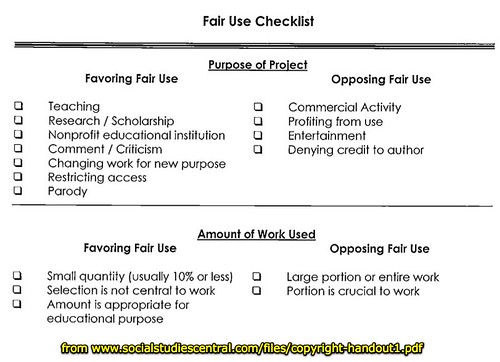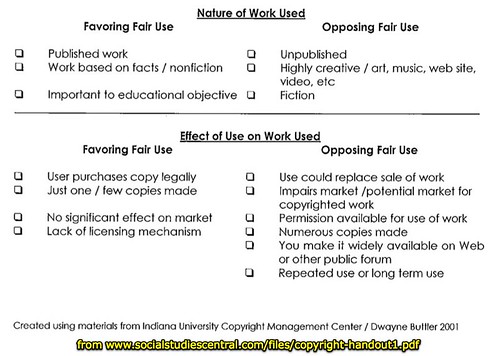These are my notes from the session “Podcasts and Intellectual Property” by Glenn Wiebe at the 2009 PodStock conference. Glenn is a Curriculum Specialist at ESSDACK in Hutchinson, Kansas. MY THOUGHTS AND COMMENTS ARE IN ALL CAPS. Glenn’s site is “Social Studies Central” and it’s a super resource. He writes the “History Tech” blog. Glenn’s preso and podcast, “Are You Legal? Copyright and Plagiarism in the Classroom” are available. Here is Glenn’s copyright handout for today in PDF format, as well as the handout “Beating the No U-Turn Syndrome” (PDF) from Doug Johnson.
I’ve recorded this with audio and webcasted/archived this session via Ustream.Disclaimer: I am not a lawyer!
– Eric Holder is the new attorney general for the US, he is a lawyer, I am not!
Glenn started this session by having participants brainstorm the specific copyright questions we have now, and wrote them down on a whiteboard
– sharing student work and copyright
– how do students protect their work
– lessons for kids: how do we teach kids about copyright?
– how do we avoid simply playing “the fear card
share concern with Doug Johnson about “hypercomplying” by school districts
– we will talk about “the u-turn syndrome” that Doug discusses
You may leave here with more questions than you came with
remember: there is LOTS OF STUFF you can use
Copyright MYTHS:
– if I do a good biblography, I’ll be ok legally
– this is for kids and education, so it’s ok and “fair use”
– if I am not putting it on the web it is ok
– if it is out on the web teachers can use it however they want
– copyright law is about mainly protecting rights of copyright owners/enriching them (IT IS ACTUALLY MAINLY FOR CREATIVITY AND PUBLIC GOOD)
“There is no such thing as true intellectual property; there is only temporary permission to control and idea.”
– not sure about the source of this
loaning someone a physical thing that we own can help us understand intellectual property: sharing
the law is designed to:
…promote the betterment of society by encouraging the creation of, and the public’s access to, useful works.
“the public’s access to” the ideas and information is key
I WONDER IF GLENN HAS SEEN THE TEMPLE MEDIA LAB’S VIDEOS ON COPYRIGHT CONFUSION? (Code of Best Practices for Fair Use in Media Literacy Education)
basics of copyright law
– copyright protects the creator of a creative work
— a unique way of expressing something
— requires only a minimum amount of creativity
— does not include facts or broad ideas
yes, your students’ work is copyrighted and protected, from the moment it is created
– students should protect their own work, that is their responsibility
this is important, if you post a student’s work it could be a violation
can’t copyright 2+2 or “democracy: facts or broad ideas can’t be copyrighted
example from several years ago, author of book “Let’s Roll” wanted to make money on that phrase and she was sued by someone who had copyrighted that phrase
– the court said that is too common a phrase, and it was not a legitimate copyright
– anyone can sue at any time, however, in the US
What could happen:
– $250 – $10,000 per infringement / misdemeanor or felony
Who is liable:
– teachers, administrators, media specialists, BOE
Doug Johnson has NOT found any evidence of a school actually being sued
– there certainly are cases of “cease and desist” letters
some participants have seen fines levied for software copyright infringements
I MENTIONED THAT I’D LOVE TO SEE A LIST OF THOSE SCHOOLS AND TEACHERS WHO HAVE BEEN SUED UNDER COPYRIGHT. I HAVEN’T SEEN THAT LIST. DOES IT EXIST?
Americans and U-Turns
– this is the point made by Doug Johnson
– in Thailand, and in lots of parts of the world, unless there is a sign that ALLOWS a U-Turn you can’t do it
– your first assumption there is unless it is specifically authorized, you can’t do a U-Turn (this is the opposite of the US)
– so the link is: in the US we focus way to much on what IS NOT permitted than what IS permitted
– that changes the philosophy a bit and some of these questions
change the focus from what is forbidden to what is permitted
there ARE guidelines about seconds and percentage of use, and many educators are looking at that as the law
MY POINT WAS THIS IS FROM THE 1986 GUIDELINES OF EDUCATIONAL FAIR USE FOR MULTIMEDIA, THOSE WERE WELL-INTENTIONED GUIDELINES BUT THEY HAVE LED IN MANY CASES TO A CHILLING OF FAIR USE RIGHTS BEING EXERCISED. IT IS A MYTH THAT THOSE GUIDELINES ARE LAW. SEE MY ARTICLE “COPYRIGHT 101 FOR EDUCATORS” FROM 2002-2003 FOR TCEA, AND MY FEB 2009 PRESO AT ITSC “COPYRIGHT FOR EDUCATORS” FOR MORE ON THIS.
when in doubt, err on the side of the user not the owner
– that can be scary, because it may contravene what some school districts are saying
Teach the point of view of both consumers and producers
things that are clearly legal
– using works in the public domain
– using a US government work
– using Creative Commons-licensed or “podsafe” content
– making “fair use” of a work
Creative Commons was started around 5 years ago of people creating their own rules
ACTUALLY AS THE VIDEO “GET CREATIVE” EXPLAINS, THE FOUNDERS ASKED THE US COPYRIGHT OFFICE HOW TO GIVE NOTICE AND PERMISSION IN ADVANCE FOR SOME TYPES OF REUSE, AND THE COPYRIGHT OFFICE SAID “WE DON’T KNOW.” THAT IS WHY CC FOUNDERS GOT CREATIVE AND STARTED THE PROJECT.
So what is fair use, the law allows some use without specific permission:
1- to criticize and comment
2- to write news articles
3- for research / scholarship
4- to practice parody
Law allows reasonable manner of use, comes down to 4 questions
– on page 9 of the handout, there are 4 questions you need to ask and your kids need to think about
– this is checklist adapted from some people in Indiana University
Remember “the pirate code” from Pirates of the Caribbean? These are guidelines!
Recommended resources
– CC Podcasting Legal Guide
GLENN HAS NOT TALKED AT ALL ABOUT THE IMPORTANCE OF DISCUSSING THE TRANSFORMATIVE ASPECT OF THE USE, WHICH IS THE TEMPLE UNIV MEDIA EDUCATION LAB MEDIA LITERACY GUIDELINES REALLY FOCUS ON THIS. I BROUGHT THIS UP AS AN ISSUE AND KEY POINT: IS IT A TRANSFORMATIVE USE OF THE MEDIA?
If you are Mac people, have kids make their own stuff with Garageband
Drape’s Takes: The Educator’s Guide to the Creative Commons
3 things to reflect on as you leave:
1- what is 1 question you still have – ask someone in your building that idea next week
2- what is 1 new resource or idea you gained this morning you didn’t have before
Technorati Tags:
copyright, education, school, podcasting
If you enjoyed this post and found it useful, subscribe to Wes’ free newsletter. Check out Wes’ video tutorial library, “Playing with Media.” Information about more ways to learn with Dr. Wesley Fryer are available on wesfryer.com/after.
On this day..
- Recent Virtual Workshops by Wes (March – April 2020) – 2020
- Scratch Day in Oklahoma City on Saturday, May 14, 2016 – 2016
- Key Takeaways from WYTECC 2015 in Rock Springs, Wyoming – 2015
- Family Oral History and Smartphones (May 2014) – 2014
- Server Alerts Via SMS Gateway or GSM Modem: Unique Identifier Question – 2012
- Lessons Learned From An Immediate Social Network Sharing Button – 2012
- Why was Osama Bin Laden Buried at Sea? – 2011
- NCLB was designed to define public schools as failures – 2010
- WordPress commenting restored thanks to phpMyAdmin table repair – 2009
- PodStock09 Stories – 2009


